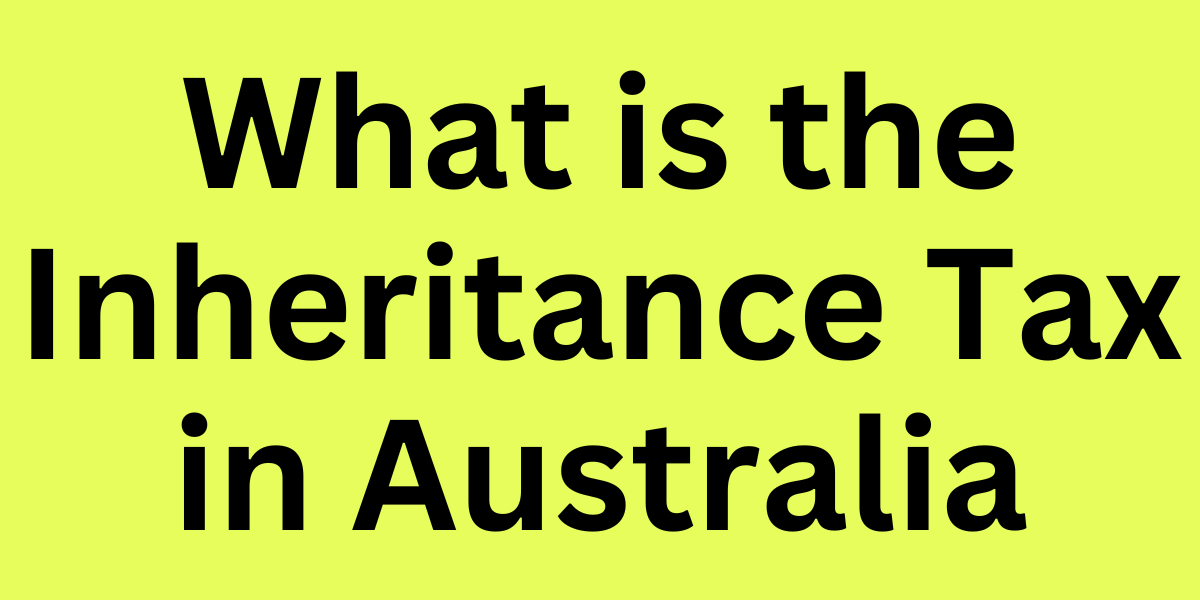In Australia, the absence of an inheritance tax means beneficiaries typically do not face taxes upon receiving assets from a deceased estate. However, certain taxes may apply to inherited assets, particularly when they generate income or are sold. This guide explores the tax implications of inheriting assets in Australia, including considerations for superannuation death benefits, capital gains tax, and income tax on inherited income.
Table of Contents
What is the Inheritance Tax in Australia
Key Points:
- Australia does not have inheritance tax; it was abolished in 1979.
- Beneficiaries, however, may face other tax obligations related to the inherited assets.
- Taxes apply when certain actions, like selling the inherited assets or earning income from them, occur.
| Aspect | Details |
|---|---|
| Inheritance Tax Status | No inheritance tax in Australia. |
| Other Applicable Taxes | Capital Gains Tax (CGT), income tax on generated income, superannuation taxes. |
Is There Any Inheritance Tax in Australia
Tax Implications for Beneficiaries:
- Capital Gains Tax (CGT):
- Applies if you sell an inherited asset (e.g., property, shares).
- Taxable gain is calculated based on the change in the asset’s value from the time of inheritance to the time of sale.
- Exemptions may apply if the property was the deceased’s primary residence.
- Income Tax:
- Income generated from inherited assets, such as rent or dividends, is taxable.
- Beneficiaries must report this income on their tax returns.
- Superannuation Death Benefits:
- Tax treatment depends on your relationship with the deceased and the composition of the superannuation.
- Dependents may receive benefits tax-free, while non-dependents may face taxes.
| Type of Tax | When it Applies |
|---|---|
| Capital Gains Tax (CGT) | When an inherited asset is sold. |
| Income Tax | On income generated from inherited assets. |
| Superannuation Tax | Based on the beneficiary’s relationship with the deceased and fund details. |
How to avoid inheritance tax in australia
Strategies to Minimize Tax Liabilities:
- Hold the Asset for Over 12 Months:
- By holding the asset for more than 12 months before selling, you can qualify for a 50% CGT discount on any taxable gain.
- Utilize the Main Residence Exemption:
- If the inherited property was the deceased’s primary residence, selling it within two years may qualify for a full CGT exemption.
- Distribute Income Strategically:
- Use structures like a testamentary trust to manage income distributions in a tax-efficient manner.
- Claim Capital Losses:
- Offset capital gains with capital losses from other investments, reducing the taxable amount.
- Plan with a Financial Advisor:
- Seeking professional advice ensures compliance with tax laws and leverages opportunities to minimize liabilities.
| Strategy | Benefit |
|---|---|
| Holding Asset for 12+ Months | Reduces CGT by 50%. |
| Selling Within Two Years | May eliminate CGT on a primary residence. |
| Testamentary Trusts | Optimizes income tax and provides asset protection. |
| Offsetting Capital Losses | Reduces taxable gains, lowering the overall tax burden. |
FAQs on Inheritance Tax in Australia
Q: Does Australia have an inheritance tax?
A: No, Australia does not impose an inheritance tax. However, other taxes like Capital Gains Tax (CGT) may apply to inherited assets.
Q: Why was inheritance tax abolished in Australia?
A: Inheritance tax was removed in 1979 to simplify the tax system and reduce financial burdens on beneficiaries.
Q: Do I need to pay taxes on inherited assets?
A: There is no direct inheritance tax, but beneficiaries might need to pay taxes such as CGT or income tax depending on the type of asset and what they do with it.
Q: What happens if I inherit a property?
A: If you sell the inherited property, you may be liable for CGT. If it was the deceased’s main residence, a full CGT exemption might apply if sold within two years.
Q: Are superannuation death benefits taxable?
A: Yes, they may be taxable depending on your relationship with the deceased and the components of the superannuation fund.
Q: Can I avoid paying CGT on inherited assets?
A: While CGT cannot always be avoided, exemptions like the main residence rule or holding the asset for over 12 months can significantly reduce it.
Q: What is a testamentary trust, and how does it help?
A: A testamentary trust is created through a will to manage and distribute assets. It helps minimize tax obligations and provides asset protection for beneficiaries.
Q: Can I offset capital gains from inheritance with other losses?
A: Yes, capital losses from other investments can offset gains from inherited assets, reducing the CGT payable.
Q: Do I need to declare inherited assets on my tax return?
A: No, you don’t declare inherited assets themselves. However, any income generated from them (like rent or dividends) or capital gains from their sale must be declared.
Q: How can I determine the cost base of an inherited property?
A: The cost base is generally the market value at the date of the deceased’s death. If the property was acquired before September 20, 1985, special rules apply.
Q: Do non-residents pay taxes on inherited Australian assets?
A: Non-residents may still be liable for CGT on the sale of certain inherited Australian assets, such as real estate.
Q: Should I consult a professional for tax advice on inheritance?
A: Yes, tax laws can be complex, and consulting a tax professional ensures compliance and helps optimize your financial outcomes.
